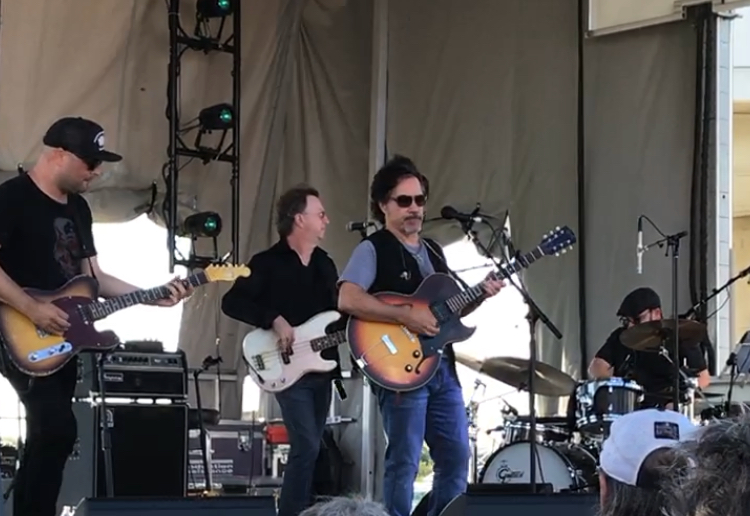Nine months ago, Billboard Magazine writer Chuck Daughin published an interview with John Oates, one half of the legendary pop duo Daryl Hall & John Oates, who had just released his fifth solo studio album Arkansas.

In that article, Daughin wrote: “Listening to the sonic flavors of Arkansas is akin to a museum where the early history of music is on display – whether that genre be country, blues or rock.”
Fast forward to September 15 at the Rock and Roll Hall of Fame Museum in Cleveland, where John Oates literally brought those words to life by giving a free concert featuring tunes from the new album as well as new (or maybe not-so-new) takes on a couple of Hall & Oates classics – all at the museum where rock and roll‘s earliest influences and its rich legacy are indeed on full display.
In front of a small but very appreciative crowd, the 70-year-old Rock Hall of Famer John Oates and his Good Road Band (featuring Guthrie Trapp on electric guitar, Josh Day on drums and Steve Mackey on bass) delighted us with about a dozen tracks that paid homage to Mississippi Delta blues as well as folk music, traditional rock and roll and even a surprising turn at reggae.

The surprising reggae turn was a rendition of “Maneater,” the 1982 No. 1 Hall & Oates pop hit that Oates said was inspired by a trip he had taken to Jamaica in the early ‘80s. The song would have been a reggae tune were it not for Daryl’s intervention, he said using a storytelling technique that rockers often do while introducing their biggest hits. He quickly acknowledged that it also might not have been a No. 1 hit had his original reggae idea stuck.
But the story illustrated the versatility of Oates, which is so often overshadowed by his more prominently featured partner Daryl Hall. Who knew that John Oates appreciated reggae, or that the new album was so rich musically in its celebration of southern rock and roll’s roots?
Well, a few lucky souls found that out Saturday afternoon in Cleveland.
Oates performed songs from his new album, like the title track – a straight-on ode to Arkansas’ place in bluegrass heritage, as well as earlier work, like the soulful ballads “Edge Of The World” and the stellar “Lose It In Louisiana” from his previous album, 2013’s Good Road To Follow.
His appreciation for blues and soul music was further on display with a jubilant rendition of Wilson Pickett’s “Something You Got” as well as a funky take on the already soulful “I Can’t Go For That,” the duo’s No. 1 R&B and pop hit from 1982. Earlier in the set, he paid tribute to the inspiration for his current album, American country blues guitarist Mississippi John Hurt.

The best thing about seeing John Oates perform solo – besides his engaging monologues and his storytelling – was being able to witness his undeniable knowledge of the music he was both performing and celebrating. Given the authenticity that he and his band mates exuded on stage, it could easily make one rethink where the bulk of the soul came from in Hall & Oates’ repertoire of hits from decades past.
If nothing else, it was a display of the individuality that Oates rarely got to show during the nearly five-decade history of Hall & Oates, the most successful duo in pop music history.
It was a great treat for an unplanned visit to the RRHOF for this writer, and one I would gladly pay to see at a future stop on Oates’ current tour.
Enjoy the below video of Oates performing that reggae version of H&O’s biggest hit, “Maneater,” as it was originally intended by the man who conceived it.
DJRob


